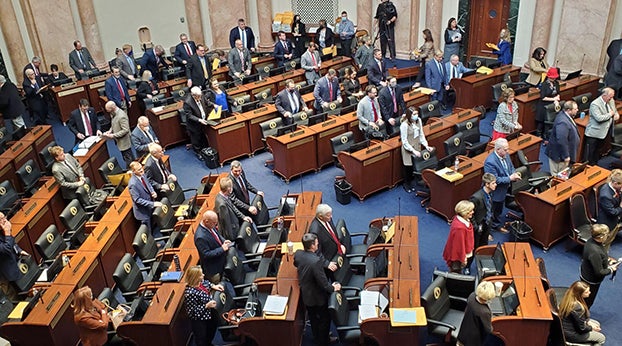Anti-transparency bill must be stopped
Published 11:23 am Tuesday, February 20, 2024

- Kentucky legislators in session. - Kentucky Today
By Jon Fleischaker and Michael Abate
It’s become an annual tradition in Frankfort: a new bill designed to chip away at the government transparency Kentucky citizens have enjoyed for nearly 50 years under the Open Records Act. This year’s bill—HB 509, endorsed by Speaker David Osborne and others in House leadership—is different, though. It would completely eviscerate the public’s right to know even the most basic things about what the government is doing in its name.
How would it accomplish this goal? Primarily by changing the definition of what a “public record” is. Today, that definition is clear: any record prepared, owned, used, possessed, or retained by a public agency, regardless of its form (paper or electronic), what it says, or where it is stored. Sure, agencies can claim that records are exempt from disclosure under other provisions of the law, but the agency must search for the records, admit they exist, and explain why they should not be released.
Not under the new law, however. Legislators are proposing to smuggle various limitations and exclusions into the definition of “public record”—opening the door to mischief and misdirection by public agencies. Under HB 509, nothing would be a “public record” unless it documents a “transaction” or “final action” of a public agency. Those terms are not defined by the law, but it’s easy to see how they will be abused.
Want to know why your kid’s teacher or coach was fired (or wasn’t)? Sorry, the allegations in the investigative file are not the “final action,” so you can’t see them. Want to know what’s in a police officer’s personnel file—for example, what Louisville knew about its police chief’s past disciplinary problems when it hired her? Too bad; those records are not “final actions” either.
Looking for a copy of body camera video? No luck there, either. How about emails between elected school board members about district policies or incidents? Now off limits. Remember the recent Pulitzer-prize winning stories about Governor Bevin’s questionable pardons, which led the federal government to re-prosecute some offenders? Those stories wouldn’t exist anymore because the governor could claim the recommendations were not the “final actions.”
But even if you somehow surmounted this new hurdle, there are more roadblocks in your way. For example, “preliminary” documents will no longer be public records. Under current law, these records can be withheld, but only temporarily. Once a final decision is reached, the reasons for it must be disclosed. Not under HB 509—the records showing why your government is doing what it is doing are permanently off limits.
Last but not least, the bill would exempt anything done on a “personal” device or email account from public scrutiny even if it concerns public business. When Sen. Damon Thayer tried to pass this exemption several years ago, public outcry forced the General Assembly to abandon that plan in favor of a narrower exemption for “communications of a purely personal nature unrelated to any governmental function.” Now they’re back at it, trying to exempt anything on a cell phone or gmail account, regardless of what it says.
Just recently the Court of Appeals reminded us of the danger of this approach: “To categorically exclude all text messages on personal cell phones from the scope of the Open Records Act would surely operate to encourage the use of personal electronic devices and place vital public records beyond the reach of citizens.”
That’s exactly right. The making of public policy is the public’s business. Citizens of all parties should unite in strong opposition to HB 509’s radical dismantling of the Open Records Act. If this bill becomes law, you’ll no longer have the right to see what public officials and employees are doing on the public’s dime.
Jon Fleischaker and Michael Abate are media law and First Amendment experts who serve as General Counsel to the Kentucky Press Association. They practice at the law firm of Kaplan Johnson Abate & Bird LLP, where they regularly litigate Open Records and First Amendment disputes across the Commonwealth. Fleischaker was among the original authors of the state’s Open Records and Open Meetings Acts.






